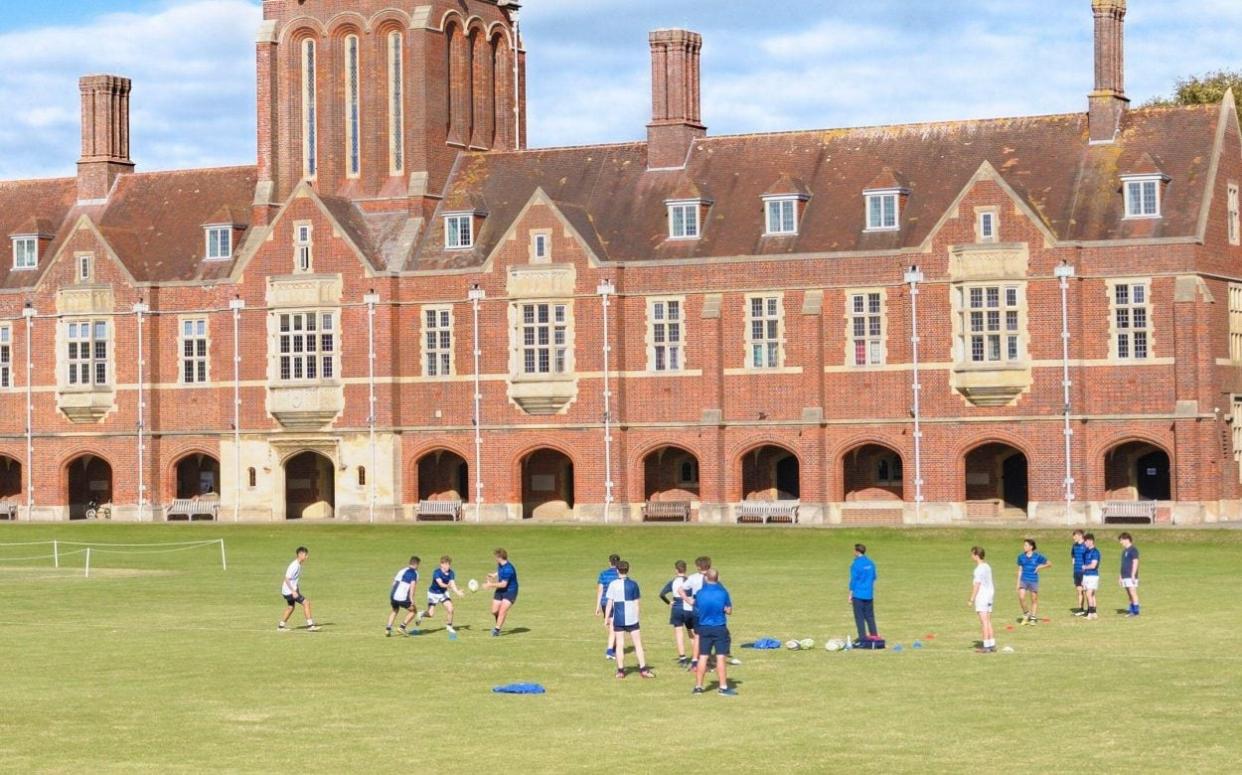Rugby is under threat in private schools – RFU needs to support vital pathway

You did not have to search hard this week to find a mixture of outrage, anger and sheer bemusement following Eddie Jones’s latest provocative interview.
Identifying a public school pathway that has supposedly produced players with a “closeted life" who lack “resolve”, Jones told the i that “you are going to have to blow the whole thing up" to develop players of the required quality.
Quite how he proposed ‘blowing up’ centuries of evolved tradition was not clear, but the comments certainly did amount to a potential dose of Semtex beneath his relationship with a crucial part of English’s rugby ecosystem. RFU chief executive Bill Sweeney was sufficiently concerned to speak directly with Jones on Sunday and, after a predictable backlash, took the highly unusual step of issuing a public statement in which the governing body pointedly distanced themselves from their own head coach’s remarks.
According to Neil Rollings, who chairs Padsis, an influential body for directors of sport in independent schools, the frustration largely stemmed from a perceived ignorance at what is actually happening on the ground. “I would have thought if the national coach wanted certain qualities, attitudes, skills, whether technical or tactical, he might want to go to the people who are managing that pathway and say, ‘This is how I want players to emerge’,” said Rollings. “I am certain that hasn’t happened. I’m equally certain if he did have the appetite to do that, he would find nothing but collaboration from people who are working in that pathway.
“It presents no solution other than to say ‘blow it up’. I don’t think it’s reasonable to say, ‘You are not producing players that have the qualities I want’ when you have never defined those qualities or approached people and asked them to support that way.
“If I was coaching the best-resourced team in the world for seven years and they weren’t delivering the results, I don't think I would be looking for answers at what they [the players] did 10 years ago. School is a part of a player’s development.
“I think the independent school sector, and the academy colleges are doing what professional rugby wants them to do: Handing over people at the age of 18 who have the skills, attitude, dedication and aptitude. Post 18, the professional and international game has to take responsibility for what it does with those people.”
Rollings, who taught rugby as a director of sport for more than two decades in four independent schools, wrote a detailed paper last year entitled ‘Challenges for the Future of Rugby Football in Schools’. In reality, he says, the RFU are heavily engaged with senior figures in the private sector to collaborate on the myriad of challenges that exist.
'There will be no school in the country that makes contact rugby compulsory'
This work is being overseen by HMC - the professional association of independent school heads - and led by Tony Jackson, a former professional player and Oxford Blue, who is now the headteacher at Barnard Castle School in County Durham.
Don Barrell, the RFU’s head of performance programmes and pathways, also works directly with independent schools to help identify any weaknesses in the system and manage playing and training workloads. “The debate about the future of the game, what the game looks like, schools, and the RFU - that is happening,” says Rollings. “ For me the outrage of this story is that all the things he is talking about are happening. Eddie Jones is either unaware of it or not convinced by it.”
Rollings stressed that there is an urgent need to redefine rugby’s future in schools - “that’s a rationale, intellectual, emerging process that is ongoing, not a fire-from-the-hip unsubstantiated vague impression” - that is unlikely to be helped by Jones’s “irrelevant” salvo. “I don't know if he knows what he is trying to say,” said Rollings, who also questioned Jones’s pre-match rhetoric at a time when schools were facing serious challenges to reassure parents about rugby’s safety, “The unfortunate language and metaphors he uses ... where it is going to be brutal, it’s going to be a war, I’m not sure that helps position the game as something that is attractive to maybe nervous parents,” he said.
The rise of football inside independent schools has affected rugby, where the contact form of the game is also no longer compulsory. “There will be no school in the country that makes contact rugby compulsory and it will be illegal to do that,” says Rollings.
Although the vast majority of directors of sport in school still have direct past experience of playing rugby, the drop-off in numbers is especially evident between Years 10 and 12. Rollings say that fewer boys are playing rugby than at any point in the last 200 years and that there is a need both to offer different formats, including touch rugby and other variants with less contact, but also proactively state benefits which stretch far behind performance or fitness to teamship and camaraderie.
“It’s place as the dominant game of the autumn term, played by a majority of boys, is under growing threat,” he says. “The game won’t die - it will just have a different identity both in clubs and schools. The ‘risk’ lobby has been mobilised. What the game hasn’t effectively done is mobilise the ‘benefit’ lobby to counter that. The benefits of the game game - widely, though tacitly understood by the rugby family - have been articulated less effectively. Rugby, in my view, has been the ultimate team game. But, once you have got choice, the game has to make itself attractive in order to return a critical mass of players.”

 Yahoo Movies
Yahoo Movies 
